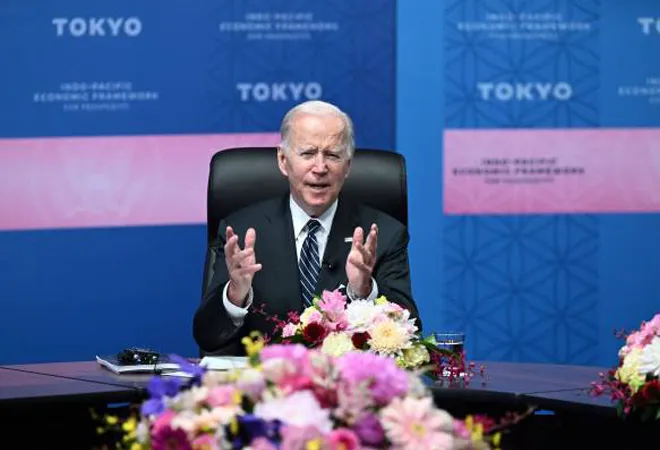
Set against the backdrop of flashing cameras and a high-profile visit to Asia, President Joe Biden finally unveiled the much-vaunted Indo-Pacific Economic Framework (IPEF) earlier this week. The IPEF, which hoped to bring 13 South and Southeast Asian countries together to shape the rules of the road on everything from technology standards to clean supply chains, has largely disappointed. From the puzzling absence of a market access component to the downright worrying lack of concrete details, the IPEF isn’t exactly cutting-edge economic statecraft.
Despite the IPEF’s shortcomings, inclusion in this new framework comes with its share of opportunities for New Delhi. Ever since it passed up on membership in the Regional Comprehensive Economic Partnership (RCEP) in 2018, it has found itself on the outside looking in as new trade configurations like RCEP and Comprehensive and Progressive Agreement for Trans-Pacific Partnership (CPTPP) have begun rewriting the economic rules of the game in Asia. New Delhi will keenly appreciate that the inception of the IPEF allows it a large, if flawed, platform to shape standards for the future, articulate its disagreements, and build coalitions with a diverse range of regional economies to secure its interests.
The digital economy is set to create close to 65 million new jobs in India by 2025, and its governance globally will be a top-order priority.
Of its four pillars, the IPEF’s promise of a “Connected Economy”, with its particular focus on digital policy, may prove of some interest to India. The digital economy is set to create close to 65 million new jobs in India by 2025, and its governance globally will be a top-order priority. Nations have scrambled to cut deals on this front with digital agreements like DEPA and the US–Japan Digital Trade Agreement. Boosting interoperability between digital ecosystems, enshrining cross-border privacy protections and joint efforts to prevent cyberattacks seem to be safe ambitions for the IPEF. So too is hammering out joint responses to China’s open ambition to turn technical standards forums into vehicles for its political vision. However, the trouble will undoubtedly arise with Washington’s unbridled enthusiasm for free cross-border flows of data with little recourse to data localisation. India’s long-standing support for data localisation will compel it to resist binding commitments or make common cause with the other developing economies at the negotiating table.
Another opportunity lies in the “Resilient Economy” pillar which aims to reorder supply chains and secure trusted connectivity. Washington’s America COMPETES Act and Japan’s new economic security legislation make clear that supply chain resilience is an idea whose time has come. While designing early warning systems to identify key commodities and ease supply chain bottlenecks will be a key priority, New Delhi will have its gaze fixed firmly on positioning itself as a key investment destination as talk turns to supply chain diversification.
However, the two remaining pillars—which deal with green economies and clean governance respectively—will hardly entice India and other developing countries. Many regional economies will see the IPEF’s focus on decarbonising supply chains and combating climate change as just another instance of the developed world asking for the moon while offering little in return. In the absence of any significant offers on climate financing to finance green transitions, developing economies will simply have to ask,
à la Jerry Maguire, to be shown the money. A similarly ignominious fate seems to await Washington’s hopes for commitments on anti-corruption and clean governance. The devil will inevitably lie in the implementation of any commitments made. While recently concluded accords like the
United States-Mexico-Canada Agreement (USMCA) enshrined stricter standards on governance, the US’ ability to put together a package of incentives gave it leverage with Canada and Mexico that it simply does not possess in the IPEF negotiations.
Many regional economies will see the IPEF’s focus on decarbonising supply chains and combating climate change as just another instance of the developed world asking for the moon while offering little in return.
That shortcoming may be the IPEF’s undoing. The Biden administration has been at pains to disparage “traditional” free trade agreements and their focus on boosting market access and trade. By eschewing the give-and-take that characterises any “traditional” negotiation, Washington is presenting developing economies with a laundry list of demands, which they can ill afford to accede to without promise of increased trade or substantial financial support. Backed into a corner, many may endorse vague joint communiques without making any firm and binding commitments. If that happens, the IPEF will be reduced from the pathbreaking agreement it was meant to be too little more than a talking shop.
India has other good reasons to avoid sweeping commitments. First, the puzzling seven-month delay in releasing even these scanty details about the new framework seems to confirm rumours of a paralyzing rift between the progressive and mainstream wings of the Democratic Party. New Delhi will rightly wonder whether it can trust the Biden administration’s ability to deliver when his party increasingly resembles a house divided against itself. Further, the IPEF may prove a victim of poor timing. Remember that formal negotiations have yet to kick off as all sides are expected to “launch collective discussions toward future negotiations”. In effect, the terms of negotiations have yet to be ironed out even as America’s midterm elections loom in the rearview mirror. With inflation rampant and an increasingly unpopular President in the White House, it takes little imagination to predict which way the electoral winds are likely to blow come November. Should the Biden’s Democrats lose their tenuous hold over Congress, it will deal a body blow to Washington’s ability to deliver on IPEF’s grand ambitions for Asia. For those reasons, New Delhi and other regional capitals may think the better of investing too much political capital into the IPEF.
For India, the IPEF’s failure to provide an economic complement to the Quad’s military strength is disappointing proof that America seems unable to walk and chew gum in Asia. With China unlikely to lose very much sleep given the Framework's glaring weakness, Beijing holds the cards in the battle for economic dominance in Asia. That is an outcome that should worry us all.
The views expressed above belong to the author(s). ORF research and analyses now available on Telegram! Click here to access our curated content — blogs, longforms and interviews.



 Set against the backdrop of flashing cameras and a high-profile visit to Asia, President Joe Biden finally unveiled the much-vaunted Indo-Pacific Economic Framework (IPEF) earlier this week. The IPEF, which hoped to bring 13 South and Southeast Asian countries together to shape the rules of the road on everything from technology standards to clean supply chains, has largely disappointed. From the puzzling absence of a market access component to the downright worrying lack of concrete details, the IPEF isn’t exactly cutting-edge economic statecraft.
Despite the IPEF’s shortcomings, inclusion in this new framework comes with its share of opportunities for New Delhi. Ever since it passed up on membership in the Regional Comprehensive Economic Partnership (RCEP) in 2018, it has found itself on the outside looking in as new trade configurations like RCEP and Comprehensive and Progressive Agreement for Trans-Pacific Partnership (CPTPP) have begun rewriting the economic rules of the game in Asia. New Delhi will keenly appreciate that the inception of the IPEF allows it a large, if flawed, platform to shape standards for the future, articulate its disagreements, and build coalitions with a diverse range of regional economies to secure its interests.
Set against the backdrop of flashing cameras and a high-profile visit to Asia, President Joe Biden finally unveiled the much-vaunted Indo-Pacific Economic Framework (IPEF) earlier this week. The IPEF, which hoped to bring 13 South and Southeast Asian countries together to shape the rules of the road on everything from technology standards to clean supply chains, has largely disappointed. From the puzzling absence of a market access component to the downright worrying lack of concrete details, the IPEF isn’t exactly cutting-edge economic statecraft.
Despite the IPEF’s shortcomings, inclusion in this new framework comes with its share of opportunities for New Delhi. Ever since it passed up on membership in the Regional Comprehensive Economic Partnership (RCEP) in 2018, it has found itself on the outside looking in as new trade configurations like RCEP and Comprehensive and Progressive Agreement for Trans-Pacific Partnership (CPTPP) have begun rewriting the economic rules of the game in Asia. New Delhi will keenly appreciate that the inception of the IPEF allows it a large, if flawed, platform to shape standards for the future, articulate its disagreements, and build coalitions with a diverse range of regional economies to secure its interests.
 PREV
PREV


